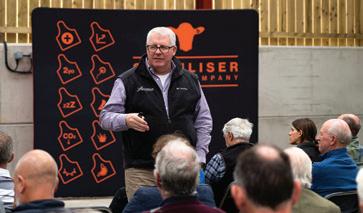
3 minute read
Beef
beef Native breeds offer a sustainable future for beef production
The value of native beef genetics is rapidly growing, with breeds such as Aberdeen-Angus showing that they can tick the boxes at all tiers within the beef supply chain.
Advertisement
Better suited to grassbased, lower input systems than continental breeds, native genetics offer the potential to boost producer margins and support environmental goals, while delivering a consistently high-quality end product.
Robert Gilchrist, CEO at the Aberdeen-Angus Cattle Society, says as a result, the industry is seeing significant growth in their use.
“As subsidies drop off and input costs continue to rise, beef farmers have had to start looking at ways to enhance their resilience, which has resulted in a significant increase in native breed BCMS registrations over the last 10 years.
“Aberdeen-Angus calf registrations have increased significantly and they’re now top of the list with 471,528 registrations in 2021. 4% growth has been seen in the last year, accounting for 24.41% of beef calves,” he says.
“More farmers are recognising that the lower input systems, where cattle can be predominantly finished off forage and grass-based diets, is a much more sustainable and financially viable way of producing beef, as the agricultural sector faces so much uncertainty.
“The nature of the reduced inputs required for an extensive beef system means they tend to have a lower cost of production and be more environmentally sustainable.”
Mr Gilchrist says the benefits extend much further than just farmers within the supply chain.
“From a consumer perspective, the intramuscular fat that native breeds offer provides the marbling which consumers desire, making it easier to cook. This gives a more consistent eating experience, which is fundamental in getting people to purchase beef on a regular basis,” he says.
Spiralling feed costs has recently highlighted major vulnerability within the meat supply chain, with pork and chicken heavily affected due to their reliance on concentrate feed. Mr Gilchrist believes that building a beef supply chain that focuses on producing meat from grass, is more resilient and sustainable.
“Beef is renowned for being a premium product and therefore typically a more expensive option than white meat. However, if we can develop a more sustainable beef supply chain at all levels, then we will be better placed to compete with other proteins in the future,” adds Mr Gilchrist.
Robert Gilchrist
Hybrid genetics the future of beef in the UK, says legendary US cattle rancher
Legendary US rancher Lee Leachman has said Stabiliser cattle should become the standard suckler cow in the UK to help farmers measure up to the future challenges the industry is facing. Mr Leachman is the CEO of Leachman Cattle of Colorado, one of the five largest seedstock breeders in the US, and made the remarks this week while on a tour of farms in Scotland and Northern England.
He described Stabiliser as ‘the best kept secret in temperate regions’, adding that hybrid genetics suited the UK extremely well.
“Britain has particular requirements,” he said.
“Running cows on grass, over wintering them inside, feeding them low quality forage and still trying to produce shapely cattle. The best way to do that is by producing hybrid cows.
“Stabilisers thrive here. They produce well over a 95% calving rate so anything that does that must thrive.
“The shoe fits. Everyone breeds cows for different reasons, but if you’re looking at data and trying to make money, then hybrid genetics are the way forward. We don’t have many people stop using them once they start.”
Mr Leacham added that for the first time, society was demanding that cattle are productive, while at the same time delivering for sustainability and the environment.
“Generally, cattle change slowly, but we are seeing rapid, managed change,” he said.
“Hybrid genetics are a game-changer and our breeders are continually moving to optimise production. This means moderately sized cows, better fertility, longevity, and better calves, which feed into everything, from lower carbon emissions to ease of care, eating quality and dollar profit.
“Hybrid production is normal in crop production, swine, and poultry. We’re using systems aligned with that in beef and I don’t think UK cattle farmers have any other source of feed efficiency tested, genomically evaluated composite genetics.”










